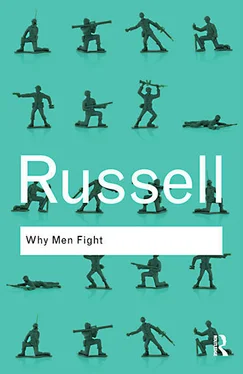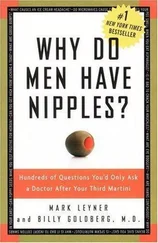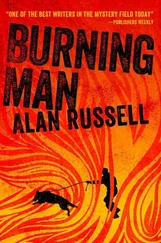The second class of men who have not been part of the force supporting the war have been those whose impulsive nature is more or less atrophied. Opponents of pacifism suppose that all pacifists belong to this class, except when they are in German pay. It is thought that pacifists are bloodless, men without passions, men who can look on and reason with cold detachment while their brothers are giving their lives for their country. Among those who are merely passively pacifist, and do no more than abstain from actively taking part in the war, there may be a certain proportion of whom this is true. I think the supporters of war would be right in decrying such men. In spite of all the destruction which is wrought by the impulses that lead to war, there is more hope for a nation which has these impulses than for a nation in which all impulse is dead. Impulse is the expression of life, and while it exists there is hope of its turning towards life instead of death; but lack of impulse is death, and out of death no new life will come.
The active pacifists, however, are not of this class: they are not men without impulsive force, but men in whom some impulse to which war is hostile is strong enough to overcome the impulses that lead to war. It is not the act of a passionless man to throw himself athwart the whole movement of the national life, to urge an outwardly hopeless cause, to incur obloquy and to resist the contagion of collective emotion. The impulse to avoid the hostility of public opinion is one of the strongest in human nature, and can only be overcome by an unusual force of direct and uncalculating impulse; it is not cold reason alone that can prompt such an act.
Impulses may be divided into those that make for life and those that make for death. The impulses embodied in the war are among those that make for death. Any one of the impulses that make for life, if it is strong enough, will lead a man to stand out against the war. Some of these impulses are only strong in highly civilized men; some are part of common humanity. The impulses towards art and science are among the more civilized of those that make for life. Many artists have remained wholly untouched by the passions of the war, not from feebleness of feeling, but because the creative instinct, the pursuit of a vision, makes them critical of the assaults of national passion, and not responsive to the myth in which the impulse of pugnacity clothes itself. And the few men in whom the scientific impulse is dominant have noticed the rival myths of warring groups, and have been led through understanding to neutrality. But it is not out of such refined impulses that a popular force can be generated which shall be sufficient to transform the world.
There are three forces on the side of life which require no exceptional mental endowment, which are not very rare at present, and might be very common under better social institutions. They are love, the instinct of constructiveness, and the joy of life. All three are checked and enfeebled at present by the conditions under which men live—not only the less outwardly fortunate, but also the majority of the well-to-do. Our institutions rest upon injustice and authority: it is only by closing our hearts against sympathy and our minds against truth that we can endure the oppressions and unfairnesses by which we profit. The conventional conception of what constitutes success leads most men to live a life in which their most vital impulses are sacrificed, and the joy of life is lost in listless weariness. Our economic system compels almost all men to carry out the purposes of others rather than their own, making them feel impotent in action and only able to secure a certain modicum of passive pleasure. All these things destroy the vigour of the community, the expansive affections of individuals, and the power of viewing the world generously. All these things are unnecessary and can be ended by wisdom and courage. If they were ended, the impulsive life of men would become wholly different, and the human race might travel towards a new happiness and a new vigour. To urge this hope is the purpose of these lectures.
The impulses and desires of men and women, in so far as they are of real importance in their lives, are not detached one from another, but proceed from a central principle of growth, an instinctive urgency leading them in a certain direction, as trees seek the light. So long as this instinctive movement is not thwarted, whatever misfortunes may occur are not fundamental disasters, and do not produce those distortions which result from interference with natural growth. This intimate centre in each human being is what imagination must apprehend if we are to understand him intuitively. It differs from man to man, and determines for each man the type of excellence of which he is capable. The utmost that social institutions can do for a man is to make his own growth free and vigorous: they cannot force him to grow according to the pattern of another man. There are in men some impulses and desires—for example, those towards drugs—which do not grow out of the central principle; such impulses, when they become strong enough to be harmful, have to be checked by self-discipline. Other impulses, though they may grow out of the central principle in the individual, may be injuries to the growth of others, and they need to be checked in the interest of others. But in the main, the impulses which are injurious to others tend to result from thwarted growth, and to be least in those who have been unimpeded in their instinctive development.
Men, like trees, require for their growth the right soil and a sufficient freedom from oppression. These can be helped or hindered by political institutions. But the soil and the freedom required for a man’s growth are immeasurably more difficult to discover and to obtain than the soil and the freedom required for the growth of a tree. And the full growth which may be hoped for cannot be defined or demonstrated; it is subtle and complex, it can only be felt by a delicate intuition and dimly apprehended by imagination and respect. It depends not only or chiefly upon the physical environment, but upon beliefs and affections, upon opportunities for action, and upon the whole life of the community. The more developed and civilized the type of man the more elaborate are the conditions of his growth, and the more dependent they become upon the general state of the society in which he lives. A man’s needs and desires are not confined to his own life. If his mind is comprehensive and his imagination vivid, the failures of the community to which he belongs are his failures, and its successes are his successes: according as his community succeeds or fails, his own growth is nourished or impeded.
In the modern world, the principle of growth in most men and women is hampered by institutions inherited from a simpler age. By the progress of thought and knowledge, and by the increase in command over the forces of the physical world, new possibilities of growth have come into existence, and have given rise to new claims which must be satisfied if those who make them are not to be thwarted. There is less acquiescence in limitations which are no longer unavoidable, and less possibility of a good life while those limitations remain. Institutions which give much greater opportunities to some classes than to others are no longer recognized as just by the less fortunate, though the more fortunate still defend them vehemently. Hence arises a universal strife, in which tradition and authority are arrayed against liberty and justice. Our professed morality, being traditional, loses its hold upon those who are in revolt. Co-operation between the defenders of the old and the champions of the new has become almost impossible. An intimate disunion has entered into almost all the relations of life in continually increasing measure. In the fight for freedom, men and women become increasingly unable to break down the walls of the Ego and achieve the growth which comes from a real and vital union.
Читать дальше












